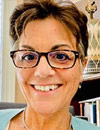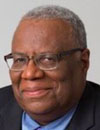Supports for people living with dementia and their families are most effective when they are person-centered, and the result of a thoughtful and responsive planning process, which takes into consideration what is important to a person and to their family. A clear and engaging approach to discovering and addressing people’s priorities as dementia progresses is essential when guiding providers to deliver optimal support. This webinar will address foundational person-centered principles, and provide examples of discovery processes in planning for people who are living with dementia in a range of settings, including in the community.
Participants in the webinar will be able to:

Leigh Ann Kingsbury, MPA, gerontologist, has been a student and practitioner of person-centered practices since the mid-1980s. Her experience includes providing community-based services to people with disabilities, and elders, many of whom communicate by using challenging actions and behavior. Her expertise includes supporting people with complex healthcare needs and using person-centered practices to support healthcare and end-of-life decision making. Kingsbury is a board member emeritus of The Learning Community for Person Centered Practices. She is a Learning Community Certified mentor trainer and a Certified Respecting Choices facilitator.

Shawn Terrell, MS, MSW, health insurance specialist, has been working in the long term services and supports (LTSS) arena for more than 20 years. He is a health insurance specialist at the Administration for Community Living, where his primary focus is on developing person-centered planning policy, capacity and quality measurement and improvement in home- and community-based services (HCBS) systems. He is also engaged in a number of policy development and implementation activities including: self-directed HCBS, managed LTSS, LTSS access and Medicaid financing. Terrell is a Person-Centered Thinking trainer in Washington, DC.

Brian Van Buren is an Alzheimer’s advocate and public speaker, a Board Member of the Western Carolina Chapter of the Alzheimer’s Association, and an Advisory Council Member for the Dementia Action Alliance. After his early onset Alzheimer’s diagnosis in 2015, he reimagined himself as an advocate. Being an Afro-American man, he felt he needed to give a face to the disease. He also feels a need to address marginalized populations such as the LGBTQ community.